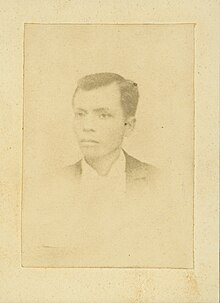Ciriaco Bonifacio
| Andrés Bonifacio | |
|---|---|

The single known extant photograph of Bonifacio.
|
|
| Born |
Andrés Bonifacio y de Castro November 30, 1863 Tondo, Manila, Spanish Philippines |
| Died | May 10, 1897 (aged 33) Maragondon, Cavite, Spanish Philippines |
| Resting place | Remains lost |
| Nationality | Filipino |
| Other names | May pagasa, Agapito Bagumbayan, Sinukuan |
| Education | Self-educated |
| Known for | |
| Political party |
La Liga Filipina Katipunan |
| Spouse(s) | Monica (c. 1880–1890, her death) Gregoria de Jesús (1893–1897, his death) |
| Children | Andres de Jesús Bonifacio, Jr. (born on early 1896, died in infancy) |
| Signature | |
 |
|
Andrés Bonifacio (November 30, 1863 – May 10, 1897) was a Filipino revolutionary leader and the president of the Tagalog Republic. He is often called "The Father of the Philippine Revolution". He was one of the founders and later Supremo (Supreme Leader) of the Kataas-taasan, Kagalanggalangang Katipunan ng mga Anak ng Bayan or more commonly known as "Katipunan", a movement which sought the independence of the Philippines from Spanish colonial rule and started the Philippine Revolution. He is considered a de facto national hero of the Philippines.
Bonifacio's mother, Catalina de Castro, a native of [Zambales]. She worked as a supervisor in a cigarette factory. His father, Santiago, was a tailor, a boatman and a local politician who served as Tondo’s teniente mayor.
He learned his alphabet in 10 years through his mother's sister and he was first enrolled in a private school of one Guillermo Osmeña where he learned Latin and mathematics though his normal schooling was cut short when he dropped out at about fourteen years old to support his siblings after both of their parents died of illnesses one year apart.
Bonifacio was blessed with good hands in craftsmanship and visual arts that he made canes and paper fans, which he and his young siblings sold, and he made posters for business firms. This became their thriving family business that continued on when the men of the family, Andres, Ciriaco, Procopio and Troadio, became employed with private and government companies which provided them decent living condition.
In his late teens, he worked as a mandatorio for the British trading firm Fleming and Company, where he rose to become a corregidor of tar, rattan and other goods. He later transferred to Fressell and Company, a German trading firm, where he worked as a bodeguero (storehouse keeper) where he is responsible for warehouse inventory.
...
Wikipedia
